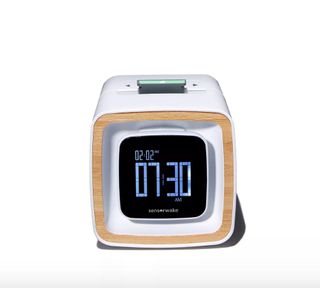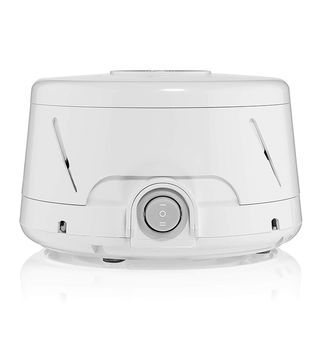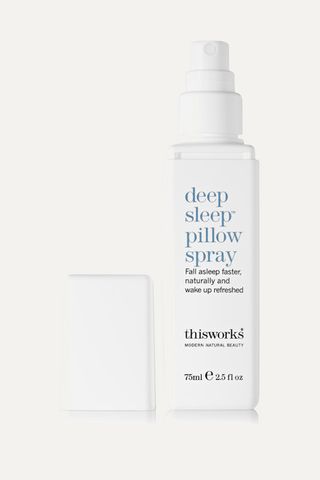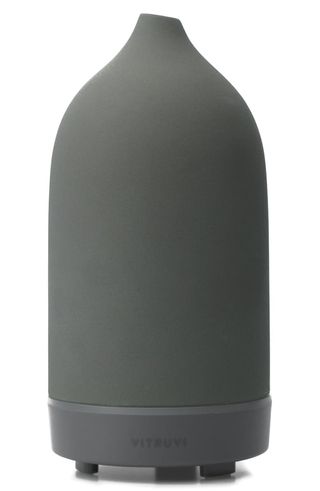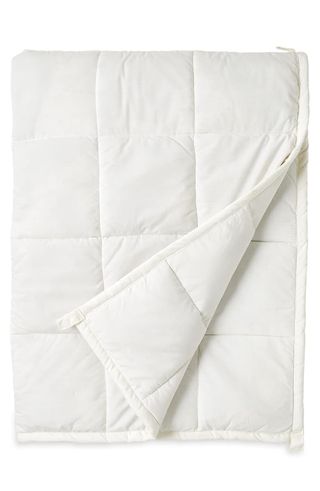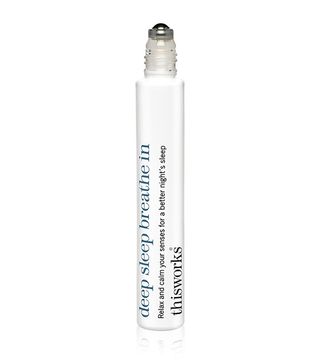Stop Doing This One Thing Before Bed to Fall Asleep Faster
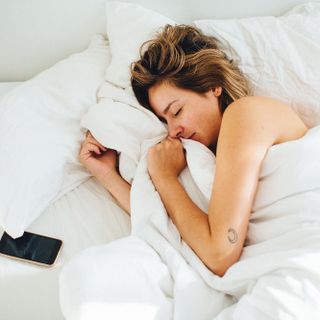
Electronics are simply a part of the average adult's daily life in the 21st century. But if there's one moment that should be screen-free, it's bedtime—or at the very least, the last few minutes before falling asleep. That's according to nearly every study published on the topic, and Terry Cralle, MS, RN, a certified clinical sleep educator.
"The light emitted from phones, laptops, and TVs has been shown to delay sleep by delaying melatonin production," she told THE/THIRTY. And that's not even taking the content itself into account. "TV shows, video games, or certain emails or social media posts can be stressful, resulting in a release of cortisol, which is not at all conducive to sleep."
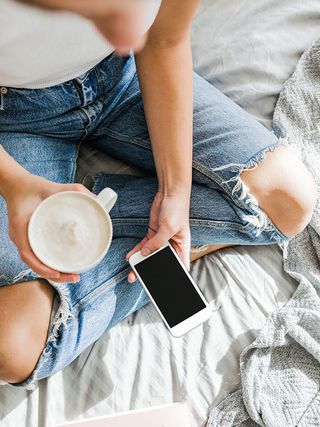
Considering that sleep is quite literally the foundation of good health, cutting screen time before bed is a good use of your time. Here's how Cralle recommends doing just that, whether you fall asleep to the sound of Netflix or scroll Instagram until you can't keep your eyes open.
Set an "Electronics Alarm"
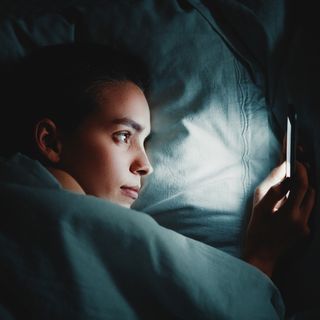
"Tech is intended to be alerting and stimulating, which is the opposite of what you need at bedtime," Cralle explains. She suggests setting a "sleep alarm" a few hours before bed to remind you to turn off electronics and begin your nighttime routine. "It's important to have a relaxing, soothing, and reproducible bedtime routine that you do every night, in the same order. This will help transition your mind and body from wake to sleep."
Sub Your Tech for a Relaxing Activity

Build your new bedtime routine around something you find relaxing, like thumbing through a magazine, chipping away at a jigsaw puzzle, or reading a non-engaging, non-fiction book. If Netflix is your specific vice, "consider falling asleep to a podcast or audiobook on a timer instead of the TV," she suggests. "You will have the distraction of listening to the content without the light."
Put a Wall Between You & Your Phone
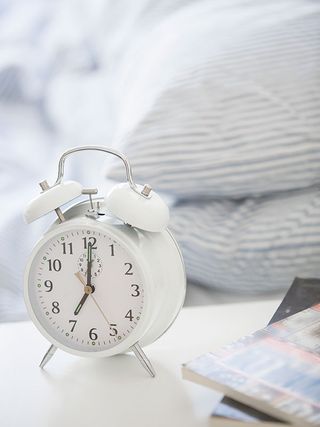
It's easy to use your iPhone alarm clock as an excuse to sleep with your device within arm's reach. But sleep disorders specialist Harneet Walia, MD, recommends eliminating the temptation entirely and sleeping with your phone in a separate room. Simply invest in an old-school alarm clock to keep on your bedside table.
If You Can't Quit Your Phone, Turn on Night Mode & Reduce Brightness
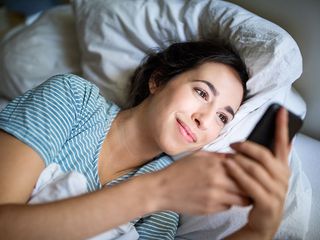
On the topic of smartphones in bed, Cralle quotes Mariana Figueiro, Ph.D., a researcher at Rensselaer Polytechnic Institute who studies the impact of screens on sleep. She maintains that "night mode" is a step in the right direction, but that alone isn't enough. "It's not just about color. The intensity matters, too," she explains. "Color needs to be shifted, and intensity needs to be dropped. These options are better than nothing."
If You Can't Quit TV, Set a Timer & Watch Reruns
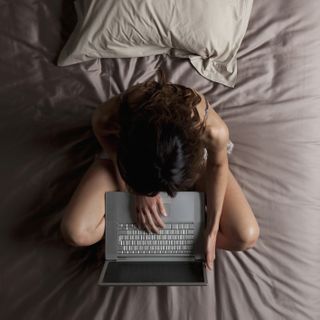
If you must watch TV before bed in order to relax and fall asleep, watch something boring and set a sleep timer. "That means no politics, nothing involving gunfire or violence, and no murder mysteries," Cralle notes. "Watch a low-key comedy or a rerun that you've seen a million times, like Friends." Remember that "we still process sounds while we sleep," she adds. "In other words, if you leave the TV on all night, it's disrupting your sleep."
Create a Sleep Sanctuary
Now that you know what to do when it comes to using electronics before bed, it's time to think about your bedroom and bedtime routine in general. There are some products out there that can make it easier for you to get to bed faster and make you feel more comfortable. Take a look at some of our favorites.
Disclaimer
This article is provided for informational purposes only and is not intended to be used in the place of advice of your physician or other medical professionals. You should always consult with your doctor or healthcare provider first with any health-related questions.
Kelsey Clark is a freelance writer and content strategist based in Detroit. She got her start in editorial in New York City as MyDomaine's lifestyle editor and has since gone full-time freelance. She now contributes to Who What Wear, THE/THIRTY, Domino, Glamour, The Zoe Report, Apartment Therapy, and more, in addition to working with brands such as Bloomscape and EyeSwoon on content strategy and copywriting. She's written about fashion, interior design, health and wellness, pop culture, food, travel, politics, and professional development, but she'd consider the first three verticals her main "beats." She's also incredibly passionate about mental health awareness and hopes to help eradicate the social stigma through storytelling and education. When she's not writing, you can find her scouring thrift stores for Levi's 501s, picking up a new vintage piece for her apartment, or exploring new restaurants and bars across Detroit.
-
 I Live for Yoga and Pilates—These Are the Pieces That Help My Flow
I Live for Yoga and Pilates—These Are the Pieces That Help My FlowTake notes.
By Humaa Hussain
-
 It's Time to Get Our Nutrition in Check for Summer—This App Is Making It Easy
It's Time to Get Our Nutrition in Check for Summer—This App Is Making It EasyThe recipe ideas are endless.
By Who What Wear
-
 If You're Battling With Digestive Issues, This Could Be Why
If You're Battling With Digestive Issues, This Could Be WhyTurns out, you may not have IBS after all.
By Kia Topps
-
 Our Editors Own a Lot of Sneakers, But This Pair Comes in First Place Every Time
Our Editors Own a Lot of Sneakers, But This Pair Comes in First Place Every TimeA major win.
By Aniyah Morinia
-
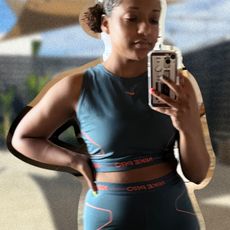 I Changed My Mind About Strength Training When I Tried This Workout
I Changed My Mind About Strength Training When I Tried This WorkoutMy confidence is officially on 10.
By Kia Topps
-
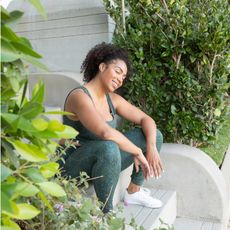 This Type of Gear Will Take Your Workout to the Next Level
This Type of Gear Will Take Your Workout to the Next LevelBring it on.
By Sarah Yang
-
 6 Essential Oils That Will Heal Your Painful Sunburns
6 Essential Oils That Will Heal Your Painful SunburnsAll-natural relief ahead.
By Samantha Parsons
-
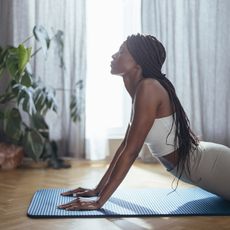 The Activewear Accessory That Can Change Your Yoga Practice
The Activewear Accessory That Can Change Your Yoga PracticeIt's so helpful.
By Sarah Yang




